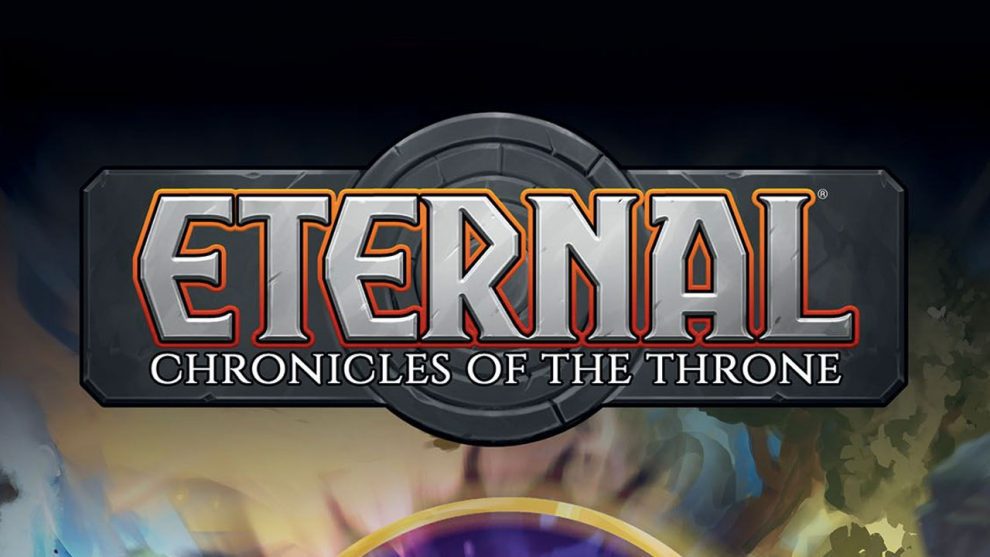I’m terrible at deck builders. I don’t mean the typical deck builders like Ascension or Dominion. We are talking along the lines of collectible card games or living card games such as Magic the Gathering. The idea of creating your own deck before the game starts is daunting since it’s hard to determine the value of your cards without constantly researching the latest “meta” or dedicating yourself to hours of playtime. Deckbuilding in board games where you experience the clever card play and combos mixed in with tactical drafting is more along with my idea of entertainment.
Sadly, I feel the genre has been trite for the past few years barely breaking out of the foundations set by Ascension which was released in 2010. Here comes Eternal: Chronicles of the Throne, which prides itself as a game focused on player versus player combat using mechanisms to simulate the decision making found in games like Hearthstone. That sounds neat, does it work?
Starts With The Familiar Steps
I’m sure you are all familiar with this one: Everyone starts with the same deck, there is a “Forge” row of six random cards that showcases what you can buy using Power, and there are two persistent piles as alternative places to purchase for your deck. Your turn will involve playing your entire hand of cards and once your turn is done, all of the cards you bought are placed in your discard pile along with your entire hand. Draw five new cards, your turn ends. Real original.
The basic premise sounds the same but there are quite a few changes from this generic formula. There are three types of cards in this game. Relics are your persistent cards that stay from turn to turn giving you consistent bonuses. Spells are your fire and forgot cards with numerous powers. Units are the fodder that will defend you from attacks while laying siege to your rivals. With the use of drafting from the middle row, you are constantly eyeing your opponent’s purchases because you want to counter their strategy, a thought process that’s not possible with blind pre-constructed decks like in Magic the Gathering. Another main attraction is you pick the order on all of your abilities that you gain from your hand of cards.
No joke. Unlike other deck builders, you don’t simply play a card, resolve the effect, and move onto the next card. The rules specifically state that abilities gained from playing a card are optional and can be used later on in your turn even after playing other cards. This simple change to conventional gameplay is like seeing color for the first time. You are now given the freedom to mix and match abilities as you see fit to optimize your turn, keeping you engaged instead of mindlessly playing one card after another without any concern about ‘timing’ rules or other fluffy nonsense. It’s like those word magnets you put on your fridge only with less innuendo.

Smooth Combat System
That’s a nice change, but what about combat? Every unit in this game has a Strength value and you won’t find any health numbers here. When you play a unit on the field, it must be assigned as an Attacker or Blocker by the end of your turn. There is no way to “standby” your units. In order to block an incoming attack, your unit’s strength must be equal or higher than the attacking unit they are blocking and you cannot group your units together to block a single attacker. If a unit is successfully blocked, both your blocker and the rival attacker are discarded. Any units assigned as attackers will remain until the end of your rival’s next turn when they will actually do the damage and will be discarded. Any remaining rival attackers at the end of your turn will deal damage to you.
This system is brilliant. Not only does it make it easy to grasp what is going on, but it also means that these units will have abilities you will need to evaluate when drafting them into your deck. Do you pick the big beefy 4 Strength unit or do you pick the 2 Strength unit that can fly over your enemy? Do you want the 2 Strength unit that gives your other units +1 Strength bonus or a unit that gains +5 Defense when it is assigned as a Blocker? There are various mechanisms to abuse and master that goes beyond constant arithmetic that has plagued other combat deck builders such as Shards of Infinity and Star Realms.
Besides the combat, there are small but effective changes here and there. At the start of the game, you have two Warp Tokens. Some cards will display a fiery icon as it’s cost. This icon means that you may spend one of your Warp tokens to instantly put the bought card into play. This is very similar to Shard of Infinity’s “Mercenary” mechanism except you are still adding the card to your deck instead of removing it from the game. I prefer Eternal’s variation of this since the two warp tokens mean you have a limited resource to consider in your decision making.

The other feature is the Eternal Throne itself. As I have mentioned previously, there are two consistent piles. These piles are Mercenary and Seek Power. Mercenaries are the basic 2 Strength units that give you one Power to buy cards while Seek Power gives you two Power and has a special Throne ability to summon 2 Strength units and remove itself from your deck. These Throne abilities can only be used when the Eternal Throne card is exposed which just happens to be under the Seek Power pile. In other words, whenever you and your rivals purchase a Seek Power card, you are just one step closer to having that Throne exposed.
This exposure not only impacts the Seek Power cards but cards in your starting deck and as well as some cards you may have bought. It’s not a sudden death situation but it does escalate the pace of the game by changing worthless or mediocre cards into potent tools. To give one brief example, one of your cards in your starting deck is called Refresh. This card, when the Throne is exposed, allows you to retrieve both of your Warp tokens, meaning each time you shuffle your deck you will get those two tokens back eventually. More Warp tokens mean more aggressive drafting thus putting pressure on everyone on the table to end the game.
Not So Great With More People
While all of this sounds good, there are some cautionary elements to consider. For starters, these changes are nice but the game still trends onto the same territory as preceding deck builders. Luck of the draw can play a part since you need to draw unit cards to defend yourself, a randomized market that might not be favorable, and it can sometimes feel like you are playing a cardboard slot machine. The game’s length in 1vs1 is also very unpredictable as it can be short as 20 minutes or as long as 45 minutes depending on the players’ skills and what is available in the Forge.
The other issue is how it handles multiple players. This game works fine with two people but the three and four-player count is a carousel free for all. You will always attack the player to your left while defending from your right. Due to the free for all nature, there is player elimination with the player to the right of a defeated player gaining five health and picking any card from the Forge for free. This player elimination problem is compounded further due to the game’s length that can go over an hour, although to be honest, that could be our group’s lack of experience with the game. With several years of card games being released, I am very disappointed to see Eternal having to resort to player elimination or not having some sort of team mode which would be perfect for this game.
I am willing to let these problems slide because what we have here is a game with various factors to consider that wasn’t touched upon in previous deck builders using an identical format. Whereas other deck builders felt like a conveyor belt of effects firing with very little input from the player, Eternal has more interesting decisions to make. You have complete control of the timing of your abilities, combos to work with, warp tokens to use, assigning your units, and what to purchase from the market. While some of what I just said isn’t new to the deck building genre, it is something further expanded and fully realized in Eternal.
Eternal: Chronicles of the Throne is a very impressive package with a generous price tag. Not many deck builders have grabbed my attention for the past few years and this one somehow managed to slip through the cracks. While it still maintains some of the issues of previous deck builders such as luck of the draw, it does mitigate these problems by introducing new tools for you to explore. Anyone who has any interest in games like Magic, Keyforge, or Hearthstone should play this one.
You can purchase this game at Amazon US











Add Comment